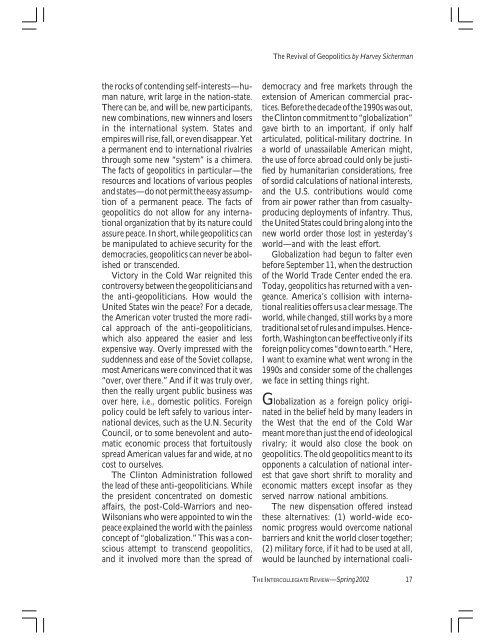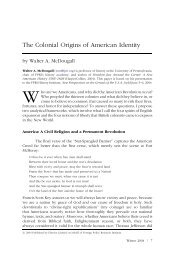The Revival of Geopolitics - Foreign Policy Research Institute
The Revival of Geopolitics - Foreign Policy Research Institute
The Revival of Geopolitics - Foreign Policy Research Institute
Create successful ePaper yourself
Turn your PDF publications into a flip-book with our unique Google optimized e-Paper software.
the rocks <strong>of</strong> contending self-interests—human<br />
nature, writ large in the nation-state.<br />
<strong>The</strong>re can be, and will be, new participants,<br />
new combinations, new winners and losers<br />
in the international system. States and<br />
empires will rise, fall, or even disappear. Yet<br />
a permanent end to international rivalries<br />
through some new “system” is a chimera.<br />
<strong>The</strong> facts <strong>of</strong> geopolitics in particular—the<br />
resources and locations <strong>of</strong> various peoples<br />
and states—do not permit the easy assumption<br />
<strong>of</strong> a permanent peace. <strong>The</strong> facts <strong>of</strong><br />
geopolitics do not allow for any international<br />
organization that by its nature could<br />
assure peace. In short, while geopolitics can<br />
be manipulated to achieve security for the<br />
democracies, geopolitics can never be abolished<br />
or transcended.<br />
Victory in the Cold War reignited this<br />
controversy between the geopoliticians and<br />
the anti-geopoliticians. How would the<br />
United States win the peace? For a decade,<br />
the American voter trusted the more radical<br />
approach <strong>of</strong> the anti-geopoliticians,<br />
which also appeared the easier and less<br />
expensive way. Overly impressed with the<br />
suddenness and ease <strong>of</strong> the Soviet collapse,<br />
most Americans were convinced that it was<br />
“over, over there.” And if it was truly over,<br />
then the really urgent public business was<br />
over here, i.e., domestic politics. <strong>Foreign</strong><br />
policy could be left safely to various international<br />
devices, such as the U.N. Security<br />
Council, or to some benevolent and automatic<br />
economic process that fortuitously<br />
spread American values far and wide, at no<br />
cost to ourselves.<br />
<strong>The</strong> Clinton Administration followed<br />
the lead <strong>of</strong> these anti-geopoliticians. While<br />
the president concentrated on domestic<br />
affairs, the post-Cold-Warriors and neo-<br />
Wilsonians who were appointed to win the<br />
peace explained the world with the painless<br />
concept <strong>of</strong> “globalization.” This was a conscious<br />
attempt to transcend geopolitics,<br />
and it involved more than the spread <strong>of</strong><br />
<strong>The</strong> <strong>Revival</strong> <strong>of</strong> <strong>Geopolitics</strong> by Harvey Sicherman<br />
democracy and free markets through the<br />
extension <strong>of</strong> American commercial practices.<br />
Before the decade <strong>of</strong> the 1990s was out,<br />
the Clinton commitment to “globalization”<br />
gave birth to an important, if only half<br />
articulated, political-military doctrine. In<br />
a world <strong>of</strong> unassailable American might,<br />
the use <strong>of</strong> force abroad could only be justified<br />
by humanitarian considerations, free<br />
<strong>of</strong> sordid calculations <strong>of</strong> national interests,<br />
and the U.S. contributions would come<br />
from air power rather than from casualtyproducing<br />
deployments <strong>of</strong> infantry. Thus,<br />
the United States could bring along into the<br />
new world order those lost in yesterday’s<br />
world—and with the least effort.<br />
Globalization had begun to falter even<br />
before September 11, when the destruction<br />
<strong>of</strong> the World Trade Center ended the era.<br />
Today, geopolitics has returned with a vengeance.<br />
America’s collision with international<br />
realities <strong>of</strong>fers us a clear message. <strong>The</strong><br />
world, while changed, still works by a more<br />
traditional set <strong>of</strong> rules and impulses. Henceforth,<br />
Washington can be effective only if its<br />
foreign policy comes “down to earth.” Here,<br />
I want to examine what went wrong in the<br />
1990s and consider some <strong>of</strong> the challenges<br />
we face in setting things right.<br />
Globalization as a foreign policy originated<br />
in the belief held by many leaders in<br />
the West that the end <strong>of</strong> the Cold War<br />
meant more than just the end <strong>of</strong> ideological<br />
rivalry; it would also close the book on<br />
geopolitics. <strong>The</strong> old geopolitics meant to its<br />
opponents a calculation <strong>of</strong> national interest<br />
that gave short shrift to morality and<br />
economic matters except ins<strong>of</strong>ar as they<br />
served narrow national ambitions.<br />
<strong>The</strong> new dispensation <strong>of</strong>fered instead<br />
these alternatives: (1) world-wide economic<br />
progress would overcome national<br />
barriers and knit the world closer together;<br />
(2) military force, if it had to be used at all,<br />
would be launched by international coali-<br />
THE INTERCOLLEGIATE REVIEW—Spring 2002 17



